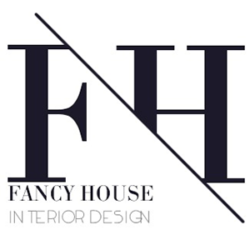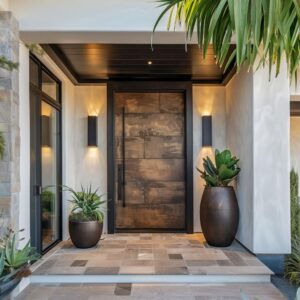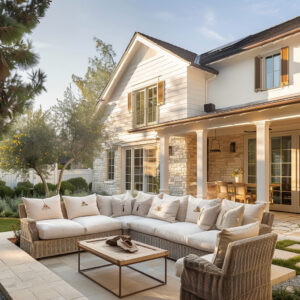Modern farmhouse style has rapidly gained popularity among homeowners who desire a harmonious blend of rustic charm and contemporary elegance. This design approach masterfully combines the traditional elements of classic farmhouses with sleek modern updates, creating spaces that are not only visually stunning but also highly functional.
Renovating a typical American house into a stylish modern farmhouse involves thoughtful integration of various materials, colors, and design elements that enhance the home’s overall beauty while ensuring practicality and low maintenance. This comprehensive guide explores how to achieve this transformation, covering every detail from the façade to the landscape, and providing useful tips for homeowners.
Understanding Modern Farmhouse Style
The modern farmhouse style is characterized by a seamless blend of old and new. It retains the rustic charm and cozy warmth of traditional farmhouses while incorporating sleek, contemporary elements that add sophistication and functionality.
Key features of modern farmhouse style homes include the use of natural materials like wood and stone, a neutral color palette with strategic pops of color, and an emphasis on comfort, simplicity, and open spaces.
Key Characteristics:
- Natural Materials: The use of wood, stone, and other natural materials is a hallmark of modern farm house design. These materials provide a sense of warmth and authenticity.
- Neutral Color Palette: Soft whites, creams, greys, and earthy tones dominate the color scheme, with occasional accents in muted shades of blue, green, or teal.
- Open Floor Plans: Spacious, open layouts that facilitate easy movement and interaction are essential in farmhouse style homes.
- Large Windows: Generous windows that allow ample natural light to flood the interiors are a key feature.
These windows often feature black frames that provide a striking contrast to the lighter exterior colors.
Facade Design
The exterior of a modern farmhouse is where first impressions are made. The materials and design elements used in the façade play a crucial role in defining the home’s character and curb appeal.
Materials: Choosing the right materials is essential for achieving the desired look and ensuring durability. Painted brick is a popular choice for a traditional farm house façade, offering a timeless look that is both durable and easy to maintain.
Vertical board-and-batten siding, often in soft, neutral hues like white or cream, adds texture and visual interest. Shingle siding can be used in combination with brick to provide a layered and dynamic appearance, enhancing the overall aesthetic.
Roof: The roof is a prominent feature of modern farmhouse homes. A steeply pitched gable roof, covered with high-quality asphalt shingles or standing seam metal roofing, adds to the farmhouse modern exterior’s aesthetic appeal and functionality.
These materials ensure durability and weather resistance, making them suitable for various climates, from snowy northern states to sunny southern regions. Windows and Doors: Large, black-framed windows are a hallmark of farm style house design.
These windows provide a striking contrast against the lighter siding and allow ample natural light to enter the home, creating bright and airy interiors. French doors and glass-paneled front doors enhance the sense of openness and accessibility, creating a seamless connection between indoor and outdoor spaces.
Symmetrically arranged windows with decorative shutters in muted colors add charm and character, reinforcing the traditional farmhouse feel while maintaining a contemporary edge.
Entryway and Porch
The entryway and porch are critical elements of a farmhouse style house, setting the tone for the entire home. They serve as the first point of contact for guests and create a welcoming atmosphere.
Design Elements: A solid wood front door, often painted in a cheerful color like teal or sage, adds a welcoming touch. The porch, typically covered and extending across the front of the house, provides a sheltered outdoor space that can be enjoyed in various weather conditions.
Supported by sturdy wooden columns and beams, the porch offers both functionality and aesthetic appeal, enhancing the overall look of the home.
Furnishing: Comfortable seating such as Adirondack chairs, wicker furniture, and small tables create inviting spaces for relaxation and socializing. These pieces are often arranged to encourage conversation and enjoyment of the outdoors.
Decorative elements like potted plants, lanterns, and outdoor rugs enhance the porch’s ambiance, making it a perfect spot for socializing and enjoying the fresh air. Adding personal touches, such as a swing or hammock, can further enhance the comfort and charm of the porch.
Yard and Landscape
The landscape surrounding a modern farmhouse should be designed to complement the home while requiring minimal maintenance. Thoughtful landscaping enhances the home’s curb appeal and provides functional outdoor spaces for relaxation and recreation.
Pathways and Planting Beds: A stone pathway, constructed of large, rectangular pavers set in a gravel base, leads visitors from the sidewalk to the front steps. This pathway not only provides a clear and welcoming route to the front door but also adds texture and visual interest to the landscape.
Planting beds flanking the pathway are filled with a variety of low-maintenance plants, such as boxwoods, ornamental grasses, and perennial flowers. These plants are chosen for their year-round interest and ease of care, ensuring that the garden remains attractive with minimal effort.
The planting beds are edged with natural stone, adding texture and a natural element to the landscape. Mulch is used to retain moisture and reduce weed growth, further minimizing the need for maintenance.
Incorporating native plants can also reduce water usage and enhance the garden’s sustainability.
Lawn and Additional Features: A lush, green lawn adds softness and provides a play area for children and pets. The lawn is edged with planting beds and trees, creating a natural border that enhances privacy and adds to the aesthetic appeal.
Decorative pots with flowering plants and greenery are strategically placed near the entrance, adding charm and a personal touch to the landscape. These pots can be easily changed with the seasons, offering flexibility in the garden design.
Subtle ground lights are integrated into the pathway, ensuring safe passage at night and highlighting the garden’s features. Additional wall-mounted lights on the façade enhance the overall ambiance and provide practical illumination, making the outdoor spaces enjoyable after dark.
Materials and Maintenance
Choosing the right materials is crucial for creating a stylish yet low-maintenance modern farmhouse. Durable, weather-resistant materials ensure that the home remains beautiful and functional with minimal upkeep.
Exterior Materials: Fiber cement board-and-batten siding and shingle siding are excellent choices for durability and weather resistance. These materials are resistant to rot, insects, and weather damage, making them ideal for long-term use.
Painted brick offers a timeless look that requires minimal upkeep. Regular cleaning and occasional touch-ups are usually sufficient to maintain the exterior’s appearance.
Windows and Doors: Weather-resistant materials ensure that windows and doors remain functional with minimal maintenance. High-quality frames, seals, and hardware help prevent drafts and leaks.
Regular cleaning and checks for seals and locks help keep them in good condition.
Roofing: High-quality asphalt shingles or standing seam metal roofing are both durable and require little maintenance. These materials provide excellent protection against the elements and are designed to last for many years.
Regular inspections and cleaning to prevent debris buildup are recommended to maintain the roof’s integrity.
Additional Features
Seamless gutters and downspouts matching the trim effectively manage rainwater runoff and protect the foundation. Decorative elements such as outdoor rugs, throw pillows, and seasonal decorations add personality and curb appeal, making the home feel warm and inviting.
Modern security features, including smart locks and doorbells, enhance safety and provide peace of mind.
Case Studies and Examples
Example 1: Suburban Midwest Home A typical suburban house transformed with modern farmhouse elements. This renovation includes painted brick, board-and-batten siding, and a steeply pitched roof.
Large black-framed windows and a welcoming front porch complete the look. The yard features a stone pathway, lush lawn, and low-maintenance planting beds, creating a harmonious and inviting outdoor space.
Example 2: Southern Charm A southern home renovation focusing on porch and garden design. The use of natural wood, comfortable seating, and decorative elements creates an inviting and functional outdoor space.
The façade combines painted brick and shingle siding, with a cheerful front door adding a pop of color. The yard is designed to be both beautiful and low-maintenance, with native plants and a well-defined lawn.
Example 3: Pacific Northwest Elegance A house in the Pacific Northwest emphasizing materials suited for the climate. The combination of fiber cement siding, standing seam metal roofing, and lush, low-maintenance landscaping enhances both beauty and practicality.
The façade features large windows that take advantage of natural light and views, while the entryway and porch provide a welcoming and sheltered outdoor space.
Ideal Locations for Modern Farmhouse Style
Modern farmhouse style is ideal for suburban and semi-rural areas across the USA. The Midwest, South, and Pacific Northwest are particularly well-suited for this design due to their temperate climates and picturesque landscapes.
This style’s adaptability allows it to blend seamlessly with various environments while offering contemporary living comforts.
Midwest: In the Midwest, the modern farmhouse style complements the region’s vast open spaces and agricultural heritage. The use of natural materials and neutral colors creates a harmonious blend with the landscape.
Features like covered porches and large windows are practical for enjoying the changing seasons.
South: In the South, modern farmhouse homes benefit from the region’s warm climate and vibrant outdoor culture. Spacious porches, lush lawns, and native plants enhance the home’s charm and functionality.
The use of bright, cheerful colors adds a touch of southern hospitality.
Pacific Northwest: In the Pacific Northwest, the modern farmhouse style takes advantage of the region’s natural beauty and temperate climate. Durable materials like fiber cement siding and standing seam metal roofing are ideal for withstanding rain and wind.
Large windows and open floor plans allow homeowners to enjoy the scenic views and abundant natural light.
Practical Tips for Homeowners
Planning the Renovation: Assess the existing structure and identify areas for improvement. Consider the layout, materials, and design elements that will best achieve the desired modern farmhouse look.
Set a realistic budget and timeline to ensure the project stays on track. Consulting with design professionals can provide valuable insights and help avoid common pitfalls.
Choosing Materials: Select durable, low-maintenance materials that complement the modern farmhouse aesthetic. Consider sustainable and eco-friendly options for added benefits.
Look for materials that offer a good balance of aesthetics, functionality, and longevity.
Hiring Professionals: Find experienced contractors and designers who specialize in modern farmhouse renovations. Their expertise can ensure that the project is executed efficiently and to a high standard.
Collaborate with landscape architects to design a yard that enhances the home’s beauty and functionality. Checking references and reviewing past projects can help you select the right professionals for your renovation.
Conclusion
Renovating a typical American house into a stylish, beautiful modern farmhouse involves a careful blend of traditional charm and contemporary elements. By focusing on key aspects such as façade design, entryway and porch, yard and landscape, and choosing the right materials, homeowners can create a home that is both visually appealing and practical.
Whether located in the Midwest, South, or Pacific Northwest, a modern farmhouse promises to provide a comfortable and stylish living environment that embraces both historical context and modern suburban lifestyle. This transformation not only enhances the home’s curb appeal but also increases its functionality and value, making it a worthwhile investment for any homeowner.










































